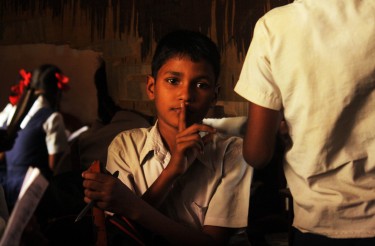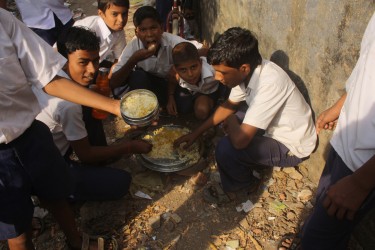Twenty-two children between four and 12 years old at a public primary school in the Indian state of Bihar are dead after eating contaminated mid-day meals on July 16, 2013.
Many more in the poor, rural village of Chapra were hospitalized in serious condition. The food is believed to have been poisoned by pesticides.
The tragedy was the worst incident in a rash of apparently tainted school lunches. In a separate incident in Bihar's Madhubani district, 15 students fell ill after eating mid-day meals. In Gaya-Bihar, one student was killed after eating school lunch there. And in another separate incident in Dhule in the district of Maharashtra, 31 children were hospitalized after having their mid-day meals.

A student at a government-funded Hindi school in outskirts of Mumbai, India, 2011. Photo by author.
The mid-day meal scheme, which began in the 1960's, is one of India's oldest and aims to encourage marginalized classes to send their children to schools. Besides the education, a meal for every student is given as an incentive for enrollment. However, ever since the start of the scheme, reports of embezzlement of food meant for children have consistently surfaced. A 2006 news report found that students of a primary school in Darjeeling were deprived of their meals for 18 months.
The issue has, as expected, taken a political twist. The political party in power has alleged that the opposition has indulged in a conspiracy to frame them. The school principal's husband is reported to be a political figure who was responsible for supplying food to the school.
The negligence on the part of the government angered many on social networking sites.
India-based Twitter user Vikram Singh (@cynicalvs) wrote:
@cynicalvs: How can kids die of eating a midday meal? It is food. Somebody needs to be tried for murder. #chappra
As soon as journalists began reaching hospitals to report on the situation, more mismanagement came to surface. The streamed video images showed surviving children laid next to each other crammed on a desk and saline water being administered.
Milind Khandekar, the managing editor of ABP News (@milindkhandekar), observed:
@milindkhandekar: Pictures from Chappra shows relatives using paper fan for children admitted in the hospital. Is this ‘ Bihar model of development?
This incident, soon enough, prompted users on social media to discuss negligence and arrogance of Indian politicians.
Abhijit Majumder, a journalist from Delhi (@abhijitmajumder), tweeted:
@abhijitmajumder: Our politicians don't discriminate. 2G for the better-off or NREGA, Mid-day meal for the poorest, all are robbed with equal relish. #Chhapra

Students of a Hindi school in the outskirts of Mumbai eat on the ground with no seating or plates. Another student shows a tiffin box and complains about the quality of the food. 2011. Photo by author.
Majumder, was making a reference to recent scams such as 2G and NREGA, which have run into billions of dollars and planted grave mistrust towards the way Indian government functions.
Another Delhi-based journalist, Raghavendra Verma (@r_verma), made a commentary on the general attitude of the teachers at these government run schools:
@r_verma: School teachers serve mid day meal to children as if they are doing some big personal favour to them. #Chhapra
Fazal Abbas (@fazlabas), a Mumbai-based Twitter user, brought some historical perspective to the ongoing discourse:
@fazlabas: Chhapra is same as our first president Dr. Rajendra Prasad left half century back. Children are dying for education.
Kiran Bedi (@thekiranbedi), a former police officer from Delhi who is recognized for her philanthropic activities and anti-corruption crusade in India, tweeted:
@thekiranbedi: Mid-day meals, at places r a scandal and un-hygienic. Teachers too r wasting time cooking!Why not serve fruits and nuts?
Bedi's narrative corroborates with the above photographic evidence. Not just Bihar, government run schools, across India, may have bigger stories of negligence and mismanagement to tell. As far as this case is concerned, the Indian government was quick to announce a compensation of 2 lakhs (about 3,367 US dollars) to the victims family.
The exact cause of how the food became contaminated is being studied – in short, a long bureaucratic process follows. Will those guilty be held accountable?







4 comments
While this is most definitely a very sad occurrence, let’s not fall in the trap of automatically blaming the Mid Day Meal scheme. It’s done a lot of good for a lot of schoolchildren. Rita Raghuvanshi, a Dean at G.B. Pant University of Agriculture and Technology in India, does a good job listing a few of its achievements: combatting malnutrition, encouraging school attendance, better attention spans and exam scores, and even promotion of social equity.
Her entire short article is worth a read.
I request you to bring me numbers or if you have time – do your own investigation about what kind of food is provided across India, and what precautions are taken – one exception does not change what million children in Indian school have to suffer. Have you read about the number of cases that came to light after the Bihar and Chhapra incident? If what you try to suggest is true, there should be at least 10,00,000 Rita Raghuvanshi (in a country as big as India) giving their testimonials and hailing the mid-day meal scheme for everyone to really believe its effectiveness.
B Venkat, while I appreciate your passionate stance, I must say that, contrary to Raghuvanshi’s argument, your comment is mostly backed by anecdotal evidence. You mention that the scheme is poisoning millions, which I frankly find hard to believe. Having said that, I was not aware of more cases of food poisoning (can you send some links please?), and obviously if they are as widespread as you claim, the scheme needs to be looked into.
You also suggest that “there should be at least 1,000,000 Rita Raghuvanshi” providing glorifying testimonials about the positive effects of the scheme for us to know of its real effectiveness. It is preposterous to claim that people voicing out their views is a measure of the scheme’s effectiveness. People typically voice our discontentment (for good reason), not satisfaction.
1) It is not a passionate stance it is a sensible one.
2) please re-read: “I have written millions of children have to “suffer” – I did not write that millions of children are “poisoned” – I am not responsible for the inferences you draw – that’s your problem. If you have doubts, you must first ask question – at least that’s the courtesy I follow.
3) I will elaborate on pt. (2) – “suffer” by the way of badly prepared food, bad administration, siphoning off of good quality grains etc. – the food which is meant for children never reaches them. All I meant to suggest was it is a problem of a macro level, and one testimonial hardly helps.
4) Please google for appropriate links… use the advanced google option with keyword “mid-day meal” and you’ll land with appropriate stories. There are plenty in the last 4 weeks.
5) Nothing preposterous – you used a “testimonial” of one woman to suggest that it would be inappropriate to “blame” mid-day meal scheme. Of course, I appreciate what she does – but it can be her own high moral grounds… and perhaps good work of the officers in her area… it is not representative of how govt works in rest of India.
6) I stick to my point, in a country where 1.2 billion people live, the govt. management should be so good that at least one million must give a testimonial (not necessarily “glorious” one’s, but a confirmation that they receive food according to the set protocol and standards)
7) I repeat, I am more concerned about this issue at a macro level.